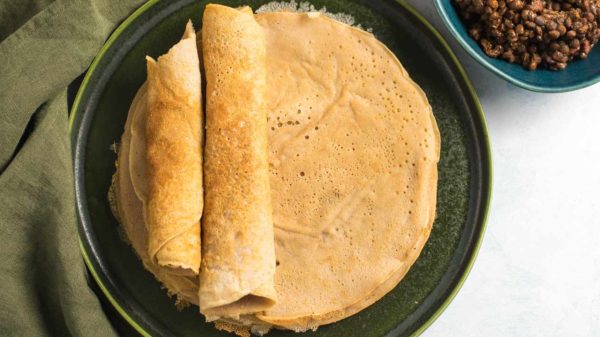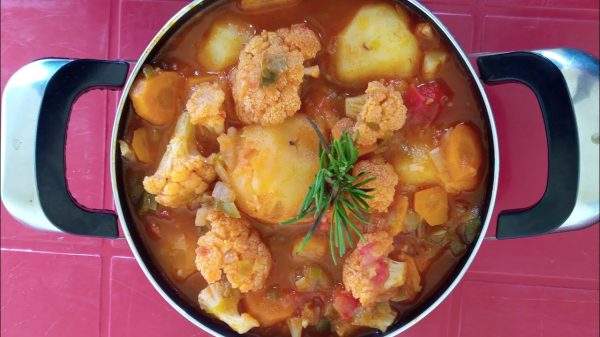In the Horn of Africa, Djibouti is a cultural crossroads where African, Arab, and European influences converge.
This rich tapestry is vividly reflected in its cuisine, which melds Somali, Afar, Yemeni, French, and Indian flavors into a unique gastronomic experience. From hearty stews to delicate pastries, Djiboutian dishes offer a symphony of tastes and textures that tell stories of trade, migration, and tradition. Whether you’re a seasoned foodie or a curious traveler, exploring Djibouti’s culinary landscape promises a delightful adventure.
Here are ten traditional Djiboutian dishes that showcase the nation’s diverse and flavorful heritage.
1. Skoudehkaris (Lamb and Rice Stew)
Skoudehkaris, often hailed as Djibouti’s national dish, is a comforting one-pot meal that epitomizes the country’s culinary fusion. This hearty stew combines tender lamb pieces with fragrant basmati rice, simmered in a tomato-based sauce infused with spices like cumin, cardamom, and cinnamon. The dish’s origins reflect Djibouti‘s historical ties to the Middle East and its colonial past under French rule. Skoudehkaris is traditionally prepared during communal gatherings and festive occasions, symbolizing hospitality and unity. Its rich flavors and aromatic profile make it a staple in Djiboutian households, offering both nourishment and a taste of cultural heritage.
2. Fah-fah (Spicy Meat Stew)
Fah-fah is a robust and spicy meat stew that showcases Djibouti’s love for bold flavors. Typically made with goat or beef, the meat is cooked alongside a medley of vegetables such as potatoes, carrots, and bell peppers. What sets Fah-fah apart is its liberal use of green chilies and aromatic spices like cumin and coriander, resulting in a dish that’s both hearty and invigorating. Often served with flatbreads like lahoh or sabaayad, Fah-fah is a communal dish enjoyed during dinners and special gatherings. Its warming qualities and rich taste make it a beloved comfort food across Djibouti.
3. Laxoox (Spongy Flatbread)
Laxoox, also known as lahoh, is a spongy, pancake-like flatbread integral to Djiboutian cuisine. Made from a fermented batter of wheat flour and water, laxoox boasts a slightly tangy flavor and a unique texture characterized by its porous surface. This bread is versatile, commonly served with honey and butter for breakfast or used to scoop up stews and sauces during lunch and dinner. Its preparation and consumption are deeply rooted in tradition, often passed down through generations. Laxoox not only complements various dishes but also embodies the communal spirit of Djiboutian meals.
4. Sambuussa (Savory Fried Pastries)
Sambuussa are crispy, triangular pastries filled with a savory mixture of minced meat, onions, and spices. Similar to samosas, these snacks are deep-fried to golden perfection and often served with a spicy pepper sauce or zuuqar, a thick tomato and vegetable relish. Sambuussas are popular street foods and are especially prevalent during Ramadan, where they are enjoyed as iftar treats. Their portability and rich flavor make them a favorite among locals and visitors alike, offering a quick yet satisfying bite that reflects Djibouti’s culinary diversity.
5. Cambaboor (Spiced Pancakes)
Cambaboor is a special-occasion dish, often prepared during celebrations like Eid. These savory pancakes are made from a batter of flour, onions, garlic, and spices such as turmeric and nigella seeds. Cooked until golden, cambaboor is typically served with subag (clarified butter) and a tangy yogurt sauce, offering a delightful blend of flavors and textures. The dish’s vibrant yellow hue and aromatic profile make it a festive favorite, symbolizing joy and togetherness during communal feasts.
6. Mukbaza (Spiced Grilled Fish)
Mukbaza is a flavorful dish that highlights Djibouti’s coastal bounty. This Yemeni-influenced recipe involves marinating whole fish in a blend of spices like cumin, coriander, and turmeric, then grilling it over high heat to achieve a smoky, charred exterior. The fish is often served with flatbreads and a side of tangy sauce, creating a harmonious balance of flavors. Mukbaza’s preparation reflects the fusion of Middle Eastern and African culinary traditions, making it a testament to Djibouti’s rich cultural tapestry.
7. Xalwo (Sweet Confection)
Xalwo, pronounced “halwo,” is a traditional Djiboutian sweet made from sugar, cornstarch, and ghee, flavored with cardamom and sometimes garnished with nuts. This dense, jelly-like confection is commonly prepared during special occasions and celebrations, offering a sweet end to festive meals. Xalwo’s rich texture and aromatic flavor make it a cherished dessert, often shared among family and friends to mark joyous events.
8. Sabaayad (Layered Flatbread)
Sabaayad is a flaky, layered flatbread similar to the Indian paratha. Made from a simple dough of flour, water, and salt, it’s rolled thin, folded, and cooked on a griddle until golden brown. Sabaayad is enjoyed with various accompaniments, from honey and jam for breakfast to savory stews and salads for lunch or dinner. Its crisp exterior and soft interior make it a versatile addition to any meal, reflecting the adaptability of Djiboutian cuisine.
9. Bariis iyo Kaluun/Digaag (Rice with Fish or Chicken)
Bariis iyo kaluun (rice with fish) or bariis iyo digaag (rice with chicken) are popular Djiboutian dishes that highlight the country’s coastal and nomadic influences. The rice is cooked with a blend of spices, and the protein—either fish or chicken—is seasoned and grilled or fried. These dishes are staples in Djiboutian cuisine, offering a satisfying and flavorful meal that embodies the nation’s diverse culinary heritage.
10. Djiboutian Banana Fritters
Djiboutian banana fritters are a delightful dessert made from ripe bananas, flour, and a touch of nutmeg, without the addition of milk or eggs. The batter is fried until golden and crispy, then dusted with powdered sugar or drizzled with honey. These fritters are a popular treat in Djibouti City and are enjoyed as a sweet snack or dessert, showcasing the country’s penchant for simple yet flavorful confections.
Exploring Djibouti’s culinary offerings reveals a rich mosaic of flavors and traditions. Each dish tells a story of cultural convergence, resilience, and the joy of shared meals. Whether you’re savoring the spice-laden stews or indulging in sweet confections, Djiboutian cuisine offers a memorable gastronomic journey that reflects the heart and soul of its people.
Subscribe to our Newsletter
Stay updated with the latest trends in African Pop Culture!


















